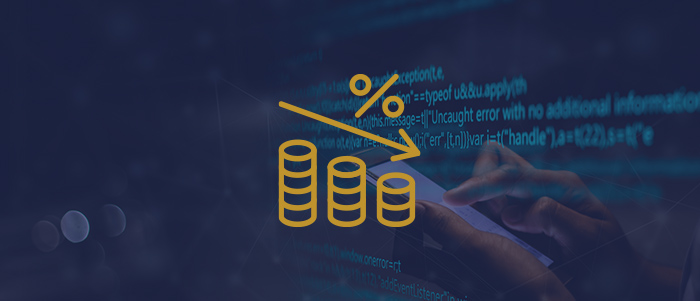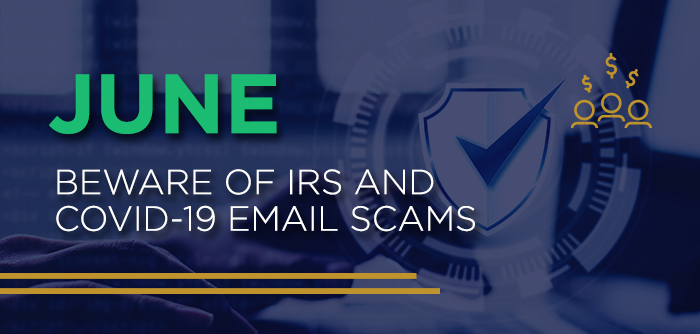Beware of IRS Email Scams
The Internal Revenue Service (IRS) has recently warned taxpayers (and tax professionals) to be on the lookout for a new wave of scams that involves calls and email phishing attempts about COVID-19 economic relief payments. When identity theft takes place online, it is referred to as “phishing”. During these occurrences, scammers will use fraudulent IRS logos in attempt to gain access to victims’ personal and financial information which may lead to tax-related fraud and stolen identities.

Always be one step ahead.
It is highly recommended that people take extra precautions during this time. Not only should taxpayers watch for fraudulent emails, but also text messages, website links, and social media outreach that may be requesting personal information.
Traditionally, the IRS will deposit economic impact payments into the direct deposit account that taxpayers previously provided on their tax returns. If no account was provided, taxpayers should expect to receive their returns via a check in the mail to the address on file. The IRS has also reminded retirees to be especially careful of these new scams. It remains true that no action is needed from seniors to receive their economic impact payments, and they should expect no agency to reach out to them for additional information.
This tax season has been especially difficult for many. Unfortunately, these types of criminal attempts are typically targeted towards groups of people who are vulnerable or in a state of need. IRS Commissioner Chuck Rettig has reminded taxpayers that “The IRS isn’t going to call you asking to verify or provide your financial information so you can get an economic impact payment or your refund faster.” If you believe that a message you have received is fraudulent, you are most likely correct.The IRS plans to significantly increase the focus on cryptocurrency by hiring outside contractors who are experts in the subject to help them identify virtual currency investors who have submitted tax returns that omit or contain incorrect information regarding their transactions.
Additionally, the following question has been put on Page 1 of the Form 1040: “At any time during 2020, did you sell, send, exchange, or otherwise acquire financial interest in any virtual currency?” to further increase focus and awareness for taxpayers.While Floridians may view this law as controversial, many will be surprised to learn that they will simply be paying tax on something they were supposed to be paying for years.
Very few know that consumers who did not pay sales taxes on their online orders are supposed to download a form a pay those associated taxes to the state on their own. The good news is that the new legislation will also forgive those who have neglected to voluntarily pay taxes on remote sales that occurred before the effective date, and will protect them from being audited in the future.

Common warning signs of scammers may include:
- Using terms such as “stimulus payment” or “stimulus check”.
- Asking taxpayers to sign over their economic impact check to them.
- Being contacted through phone, email or social media to provide personal information.
- Being told you can receive your tax refunds and relief payments faster.
- Receiving a bogus check and being asked to verify personal information to cash it.
The IRS Criminal Investigation Division is working to identify scammers and shut them down. In the meantime, the best way to stay up to date with the latest information regarding economic relief for COVID-19 is to visit IRS.gov.

At Brock CPA, we stay up to date with the ever-changing tax laws and work with you to analyze changes in your
Unfortunately, this type of criminal behavior has become extremely common today. Our team of tax planning professionals at Brock CPA stay up to date with ever-changing tax laws and are here to assist you with whatever issues you may encounter during this time.
We encourage you to reach out to us with all tax-related inquiries by calling our offices at 904-330-0268 or emailing dbrock@brockcpa.com.



